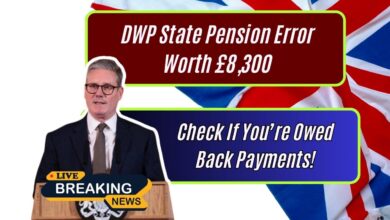Universal Credit Payment Estimator: What You’ll Get Based on Your Income, Rent & More
Universal Credit Payment Estimator: If you’re wondering, “How much Universal Credit will I get?”, you’re not alone. With the rising cost of living and recent updates to benefit payments in the UK, understanding your entitlement is more important than ever. Thankfully, Universal Credit Payment Estimators make it easy to get a reliable estimate based on your income, rent, savings, and other factors.

Whether you’re employed, self-employed, unemployed, or on a low income, this guide walks you through how to estimate your Universal Credit, what factors affect your payments, and how to apply confidently.
Universal Credit Payment Estimator
| Topic | Details |
|---|---|
| Standard Monthly Allowance | £316.98 (Single under 25) to £628.10 (Couple over 25) Source |
| Benefit Increase (2025) | 1.7% rise in most payments including carers’ element Source |
| Debt Deductions Reduced | From 25% to 15% of your allowance as of April 29, 2025 Source |
| Savings Thresholds | Payments affected above £6,000; ineligible above £16,000 |
| Top Calculators | Turn2us, Entitledto, Policy in Practice, MoneyHelper, Universal Credit Calculator UK |
| Official Website to Apply | GOV.UK Universal Credit |
Estimating how much Universal Credit you’ll receive doesn’t have to be complicated. With the help of official payment estimators and recent 2025 updates, you can easily determine your entitlement and apply with confidence. Using a benefits calculator gives you a clearer picture of what to expect, whether you’re just starting out, managing debt, or transitioning between jobs. Make sure to stay informed, take advantage of increases, and seek expert advice when needed.
What Is Universal Credit?
Universal Credit is a monthly payment designed to help with your living costs. It’s for people who are:
- On a low income
- Out of work
- Unable to work due to health or care responsibilities
It combines six older benefits into one simple payment, making it easier to manage finances. These include Jobseeker’s Allowance, Income Support, and Housing Benefit.
Why Use a Universal Credit Payment Estimator?
Navigating benefits can feel confusing, especially if your circumstances are complex. That’s where Universal Credit calculators come in. These tools provide a realistic estimate of what you’ll receive, helping you plan ahead.
Top Universal Credit Estimators
Turn2us Benefits Calculator
https://benefits-calculator.turn2us.org.uk
Simple and easy to use, ideal for first-time users.
Entitledto Calculator
https://www.entitledto.co.uk
Offers detailed benefit estimates and savings projections.
Policy in Practice: Better Off Calculator
https://www.betteroffcalculator.co.uk
Helps you understand how work or changes impact your income.
MoneyHelper Benefits Tool
https://www.moneyhelper.org.uk
Government-backed, reliable, and accurate.
Universal Credit Calculator UK
https://universalcreditcalculator.uk
Tailored specifically to Universal Credit in the UK.
Factors That Affect Your Universal Credit Payment
Standard Allowance
Your standard monthly allowance depends on your age and relationship status:
- Single and under 25: £316.98
- Single and 25 or over: £400.14
- Couple and both under 25: £497.55
- Couple and one or both 25 or over: £628.10
Housing Costs
If you rent your home, your housing element will cover some or all of it. However, Local Housing Allowance (LHA) rates may apply, and not all rent is covered.
Children
You may get more money if you have children:
- First child (born before 6 April 2017): £333.33/month
- Additional children: £287.92/month
Disability or Carer Status
You may qualify for extra if:
- You have a disability: up to £416.19/month
- You care for someone: £201.68/month (from April 2025)
Income and Savings
- Under £6,000: No effect on payments
- £6,000–£16,000: Payments gradually reduced
- Over £16,000: Not eligible for Universal Credit
2025 Updates You Should Know About
Benefit Increases (April 2025)
In April 2025, Universal Credit payments increased by 1.7% to adjust for inflation. This includes changes to:
- Standard allowances
- Carer’s element
- Child elements
Debt Deduction Reductions
As of April 29, 2025, the maximum debt deduction from Universal Credit dropped from 25% to 15%.
This means some families will see up to £35 more per month in their payment.
Step-by-Step Guide to Estimating and Applying for Universal Credit
Step 1: Gather Required Information
Before you use an estimator or apply, collect the following:
- Income and payslips
- Rent and housing costs
- Childcare costs
- Savings, pensions, investments
- Disability or carer information
Step 2: Use a Calculator
Pick one of the calculators listed above. Most take about 10–15 minutes and offer instant results.
Step 3: Apply for Universal Credit
Visit GOV.UK Universal Credit to start your application.
You’ll need:
- Government ID
- Bank details
- Details from Step 1
Step 4: Get Advice if Needed
If anything feels unclear, reach out to:
- Citizens Advice
- Turn2us
- Your local Jobcentre Plus or council
£200 Cash Boost for Millions – Check If You’re Eligible for the 2025 Payout!
DWP and HMRC Payment Bombshell for May! Check If Your Benefits Are Affected
DWP Benefit Changes in May: Will You Get a Double Payment or Lose Out?
FAQs on Universal Credit Payment Estimator
How often is Universal Credit paid?
It’s paid monthly. In Scotland, you can choose to be paid twice a month.
Can I get Universal Credit while working?
Yes. You may get less depending on your income, but work is encouraged.
How long until I get my first payment?
Usually 5 weeks. You can apply for an advance if needed sooner.
What if I live with a partner?
You must apply as a couple. Their income and savings will count.
Do children or disabilities increase my payment?
Yes. You’ll receive additional amounts depending on your family and health circumstances.







